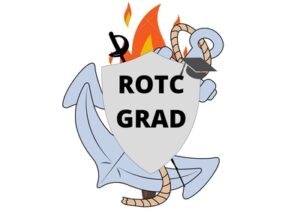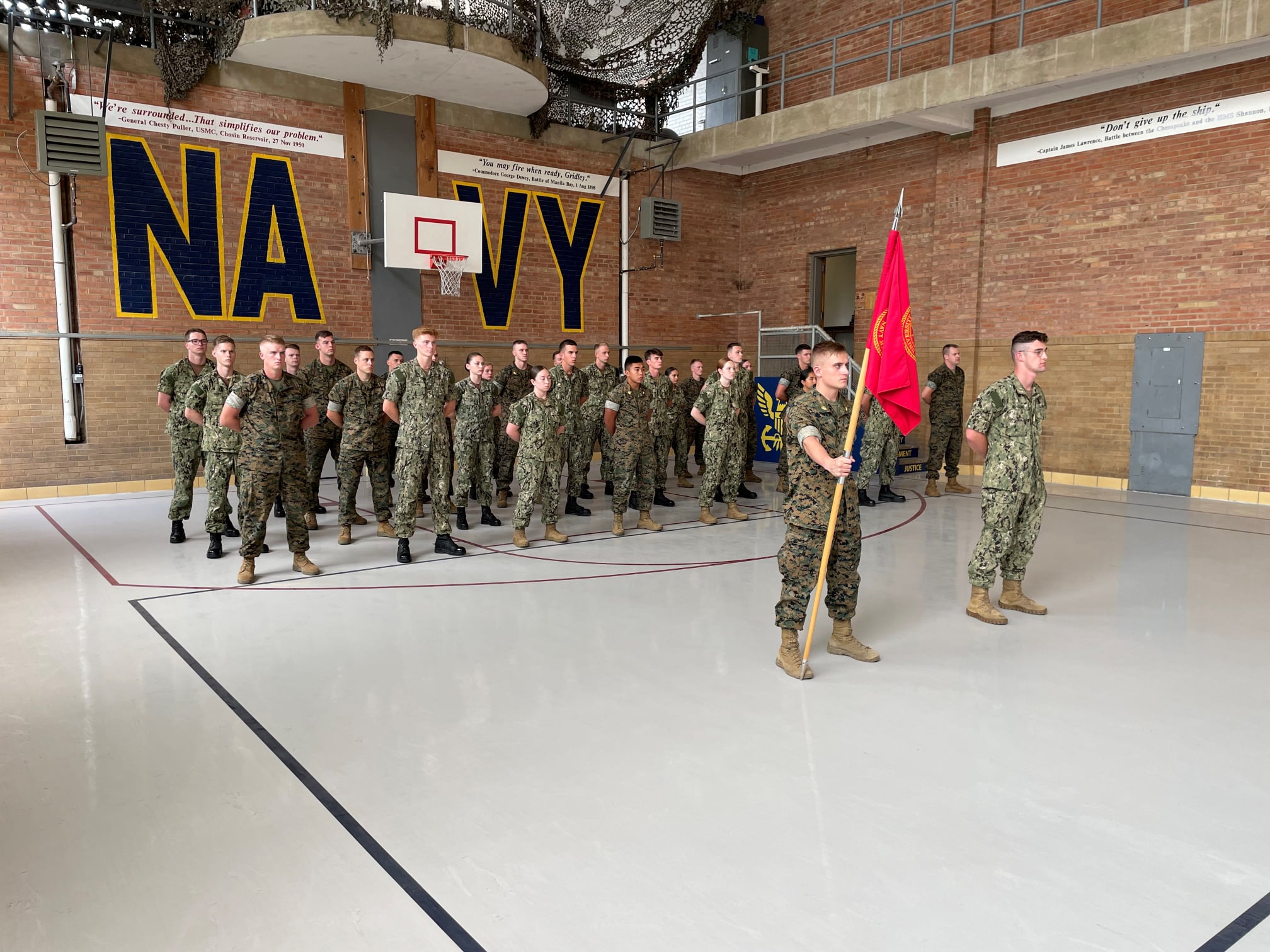
Introduction
Before I joined ROTC and was in the application process, I thought that they would be simply paying me for school. What I didn’t realize is that there is so much more that goes into this training program that prepares you for in the military, as well as some other things that I’ll talk about in this article.
If you are thinking about applying for this program, you need to be informed about the various activities that this program has you partake in. Some of it is extremely exciting and other things like drill competitions can sometimes interfere with academic study and catch you off guard.
So what do you really do in ROTC and NROTC?
Throughout the four years of going to college and attending this program, cadets and midshipmen conduct weekly morning workouts, rifle drill, and receive military leadership classes every Thursday to become officers in the military. Senior cadets/ midshipman assume additional responsibilities planning unit events like paintball, martial arts classes, and leadership challenges which take place once a week in the evening.
What a day in ROTC looks like
Most Navy, Army, and Air Force ROTC units are the same across the country with a few exceptions. For most people, you’ll have Monday morning workouts with a unit that’s majority body weight exercises at the university’s on-campus gym. Some units have a gym inside their own building which is extremely nice (you’ll usually have 24 hour access to it).
Lab Days
Thursdays from 3-5pm are “lab days.” This is where your unit meets together for a leadership or military related class that ranges from topics such as military case studies, guest speakers, tactical decision games (TDGs), and team building events. For some lab days, our unit went to a trampoline park just for fun.
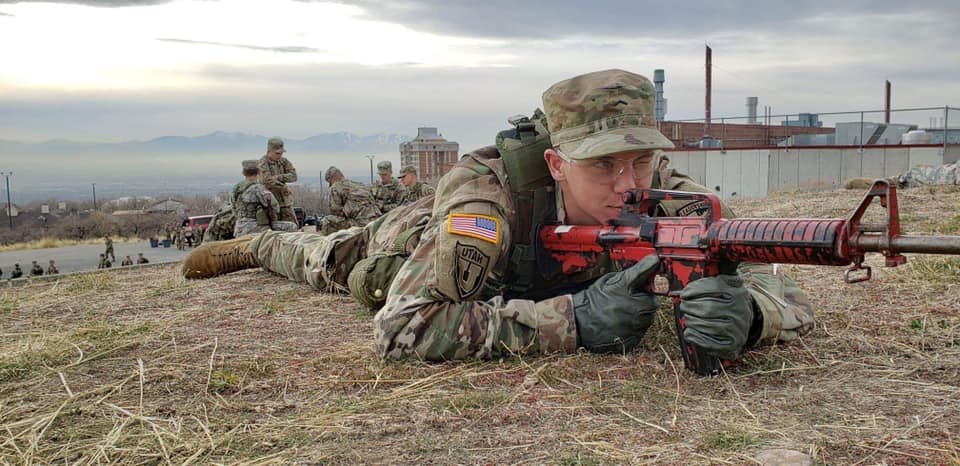
Drill Practice
During the spring semester, most units will start doing rifle drill practice Thursday mornings before university classes start. Practice goes once or twice a week until the culminating drill competition against takes place at the hosting school. You’re graded on how well your unit performs each movement with the rifle with precision and accuracy with hand placement. My school would bus 8 hours to Washington State University and compete against several western universities. We won my freshmen year. For a more in-depth look at this, check out this article on ROTC drill explained.
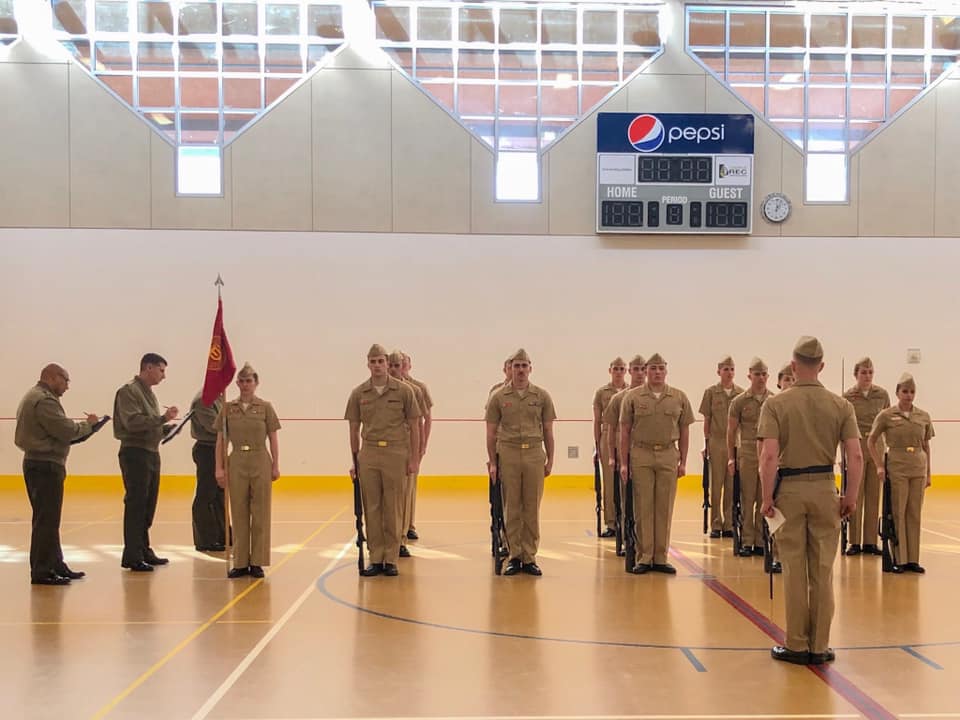
Officer Candidate School Preparation
Army ROTC conducts Ranger Challenge Friday mornings for those interested in doing combat arms (infantry, artillery, etc). It’s a class open to all ROTC branches and consists of ruck runs, tactical classes, and more intense training physically and mentally. Marine midshipman life varies a lot compared to their Navy counterpart, check out this article for the key differences if you’re on the fence.
Navy ROTC has an equivalent class called Bulldog which trains Marine Option midshipman for Officer Candidate School. These classes prepared me the most and helped me be massively successful by the time I went to OCS.
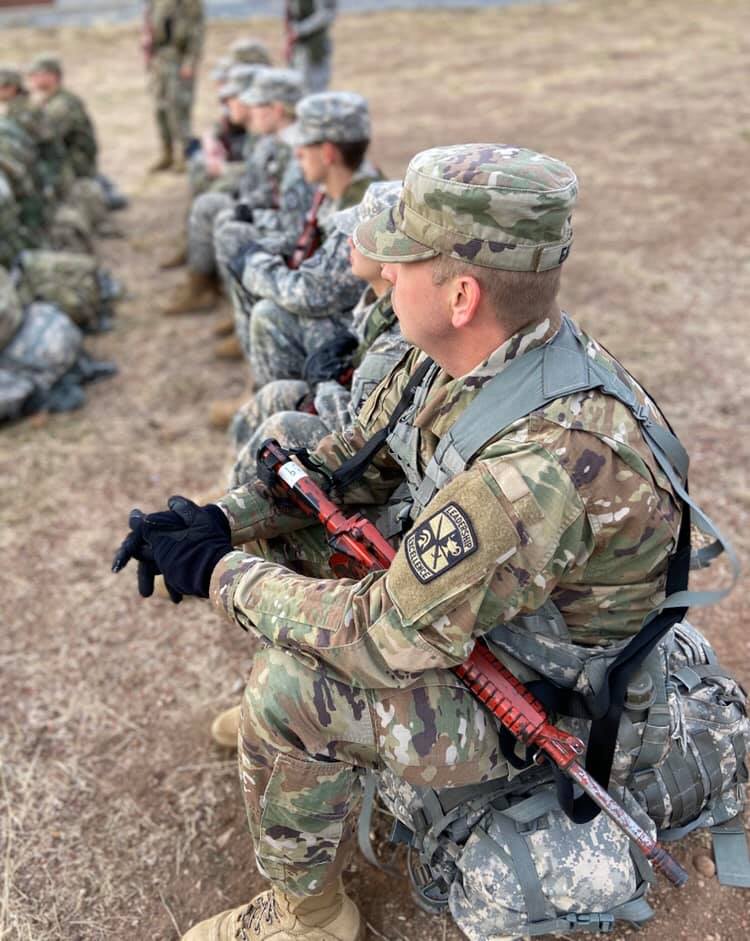
Your college study is still top priority for ROTC units, which means they try to work with your schedule if you have conflicting classes (if your unit has good leadership and doesn’t overtask you with admin work).
Extracurricular activities in ROTC
After your freshmen year, your unit will give you additional responsibility. They’ll put you in charge of a Thursday lab event, which means you have to plan, coordinate, and brief your leadership on how the event will go. I was in charge of several events throughout my four years such as the ones below:
Officer in Charge Events (OIC):
- Leadership Reaction Course (LRC). An event where one person leads their fire team through an obstacle with specific task in mind such as transporting an ammo can across water obstacles. I had to call to reserve the range, come up with a carpool roster, and create a PowerPoint presentation and give to the Commanding Officer about the scheme of maneuver for the whole day.
- Medical Emergencies training. I planned three stations that taught different combat life saving drills. For this lab, I had to contact three corpsman, go over the curriculum with them, and stage tourniquets, bandages, and other gear throughout the classrooms, and brief the ROTC leadership on how it will go.
- Combat Fitness Test (CFT). I had to reserve the track and field on campus, set up cones, and take a class on how to score these tests.
- 6 Mile Hike. I biked the route I planned on using, took photos of the signs on where to turn left or right on, and then created the packing list for the unit as well as the timeline for the day. I also had to plan a second route for a safety vehicle to follow us incase someone sprained and ankle and had to get extracted.
Some units have a shooting team you can join and compete on. - Shooting competitions: My friend won the shooting competition against another unit our junior year.
- Grading Drill Teams: No matter how do you feel about JROTC cadets in high school, they actually work pretty hard. Sometimes they need volunteers from adjacent college units to grade their drill competitions. It’s a good event to put your face in front of aspiring officers and even have a positive influence on their leader ship development.
Color Guard
I had the opportunity several times to present the flags during home football games. My class and I frequently took the stage as we marched out in our dress blues and presented colors before each game. it was an awesome way to give our unit visibility and participate in a noteworthy event in front of tens of thousands of people.
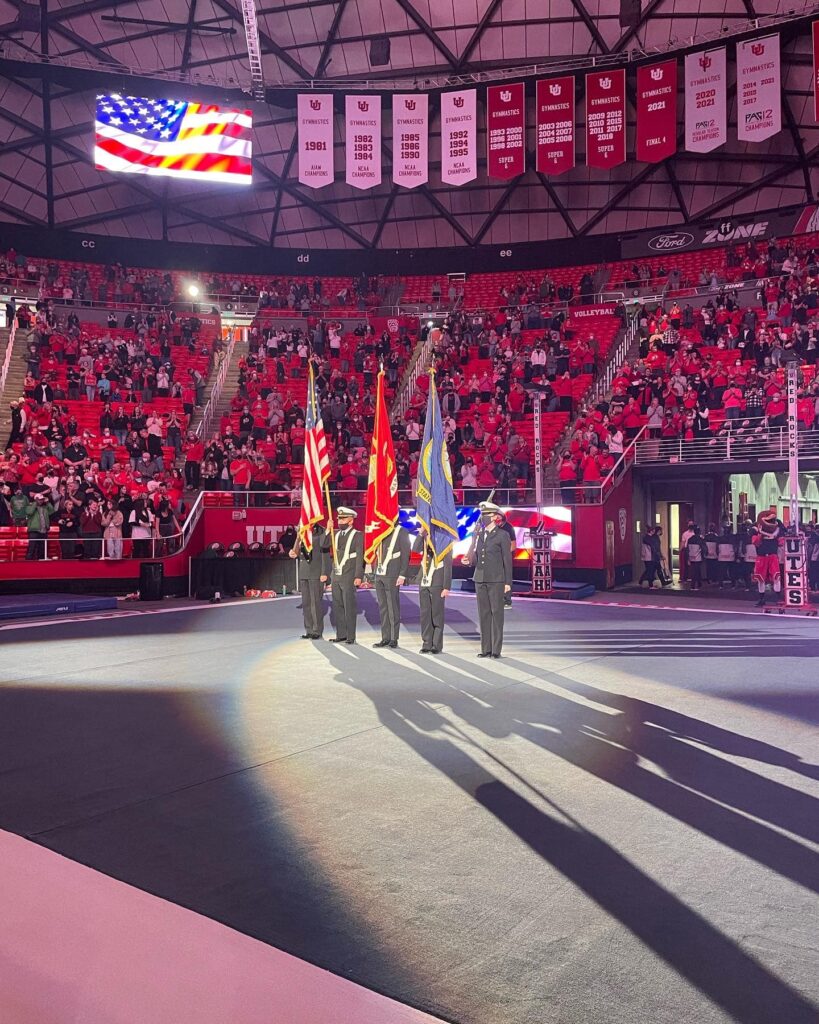
We also were on TV. Army ROTC cadets would pull the string on cannons every time we scored a touchdown, and the loud boom always startled the crowd but they loved it. I didn’t see much Air Force ROTC participation in extracurricular events, but they also focus heavily on academic workloads and don’t do things outside the unit as much.
Training for color guard will take a few hours of practice, but once you have the technique down and don’t have to think about it, it’s really fun to do it in front of a large audience. Our unit even did a 9/11 color guard ceremony honoring the firefighters.
Volunteer Work
Our unit had good working relations with the firefighters and law-enforcement in our city. A couple times each semester, we would volunteer to help clean up trash, while it wasn’t the most exciting work, it was nice to feel like we were getting back to the community we lived in. The firefighters hooked us up a few times by letting us use their training buildings to practice rappelling and putting out simulated fires.
Things you have to do in ROTC
Fundraising
This is the biggest downside of ROTC. Unfortunately most units don’t have enough money to fund your Thursday Lab days. Paying martial arts instructors and guest speakers isn’t always free. Most units will have you work football and basketball games scanning tickets or directing parking. Freshmen have to work the most games while seniors don’t have to as often. The good news is you only have to work until halftime.
Pro Tip: Don’t buy a season pass for football or basketball your freshmen year. You’ll have to work most home games but you get in for free at halftime anyway.
Duty
In the real military you stand 24 hour duty at a desk making sure government property and gear isn’t stolen. In ROTC, all you have to do is unlock the building in the morning, raise the flags outside your unit, leave and come back in the evening to lock the doors and lower the flags (and take out the trash). I usually had duty once a month.
Billets
I had no idea what this word meant for the first year I was in the program. This is basically a staff position you hold at the unit that’s a collateral responsibility. Some positions are more demanding than others. Here’s some examples of billets you could hold for a semester:
- Physical Training Officer: Plans the weekly unit workouts and leads them each morning. Cadets and midshipman who don’t pass fitness tests with a good score have to do additional morning workouts on Wednesdays and Fridays. The physical training officer will plan and lead these too.
- Operations Officer: Manages the people in charge of planning Thursday lab events and makes sure they’re staying on the timeline for the semester and tracking due dates for tasks. This is one of the busiest billets.
Squad leader: maintains accountability of squad members, passes information from the unit leadership and makes sure everyone shows up to events on time. - MIDN or Cadet Commanding Officer: in charge of managing all the subordinate billet holders and is responsible to the instructor staff for everything the class does or fails to do. This is the hands down the best leadership training you can get while in ROTC and is the most realistic.
At the end of the day, there’s some major benefits to joining ROTC vice enlisting. While there’s always pros and cons, I really did enjoy my experience and the training I got.
Does ROTC prepare you for the military ?
ROTC and NROTC thoroughly prepares you for the military by giving you leadership classes, hands on experience with tactics, and one on one training with hand-picked active duty instructor staff. It prepares you in handling busy schedules, juggling significant responsibility, and teaches you people skills most importantly.
Some cadets and midshipman try to skate by the whole program and do the minimum possible work. These individuals did not grow as a leader as much as those who sought additional responsibility and volunteered for extra events.
Summer Training: Almost all cadets and midshipman will go to month or week long training in the summer. The summer after my freshmen year, I spent 4 weeks in the fleet in San Diego riding on helicopters, submarines, shooting guns, and learning about careers and life in the military. The summer after, I spent a week shadowing an infantry unit and trained everyday with them in the beautiful Virginia summer humidity while my Navy friends spent a week on a carrier learning about overseas life. These trainings were great exposure to what the real military is like.
Few things prepare you to be an officer more than working on yourself in your free time. While most of my midshipman class went to parties every Friday and Saturday, I was in the gym working on my physical weaknesses and reading books in my free time. You can still have fun in ROTC and NROTC, just realize that you should also prioritize your own self development so you become the best officer possible.
Conclusion
In short, ROTC and NROTC takes a pretty big time commitment in addition to school. It will have busy weeks and slow weeks just like other organizations.
As you stay in the program longer, you’ll get better at managing your schedule and have more and more free time. The more you can start managing time now, the better you’ll be by the time you start this program.
Important note: if you study a hard major like mechanical engineering or computer science, try to take summer classes- you won’t have any ROTC responsibilities over summer unless it’s those dedicated summer training events.
Thanks for reading! If you have any further questions or comments, feel free to reach out at theyouculture@gmail.com and I’ll do my best to reply.
